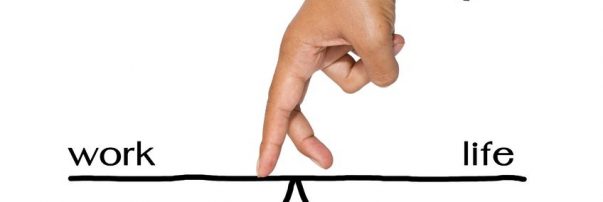May 8th, 2016 •
Comments Off on 6 Ways for Men to Improve Their Work/Life Balance

Most men (myself included) find it challenging to juggle the competing demands of their job and personal lives. Every man wants to do the best for his family and at the same time further his career, let alone his personal health and recreational goals. Unfortunately, many work for companies or organizations that are highly competitive and seem to demand 100% of their employees’ time. If you find yourself in this situation, then help is at hand.
I will explain six ways for you to move towards a better work/life balance and get all areas of life working towards your common goals of health and happiness.
1) Establish your priorities
The first step is to spend 15 minutes, perhaps during a lunch break, to write down a list of all the tasks and responsibilities you have in your life, and then rank each one according to its importance from the most important to the least important. You should include your wife, children if you have any, your extended family, friends, your business or job, and your sports and hobbies. While it may be tempting to think you don’t have enough time for all of them and cut one or more of these from your list, don’t do so. A well-rounded life needs all of these things. In essence, they are complementary elements of a healthy man, rather than competing priorities.
When ranking your priorities, it is crucial that you are honest with yourself and evaluate what is truly most important to you before putting a number next to each item on your list. For example, you should be very wary of assigning your hobby a higher priority than your family, particularly if you’re a family man.
As much as anything, the ranking process is a way for you to become more aware of what has real meaning in your life. It can sometimes yield surprising results, so don’t skip this step. It can also give you a general indication of where you should direct your time and energy.
2) Use effective time management
Ranking your priorities will make it somewhat easier for you to allocate time to the most relevant things in your business and personal life. However, it is important to realise that the number five priority on your list, for example, doesn’t necessarily warrant only a fifth of the time that you spend on your first priority. Quality of time spent is just as important, if not more so, than the quantity of time you spend on a particular activity.
Spend two minutes every morning jotting down a list of your main tasks for the day. This will help you to stay focused whenever you are tempted to get involved with things that don’t concern you, which is a risk in any workplace. Give yourself the satisfaction of ticking off tasks as they are done, but don’t beat yourself up if there are a few left at the end of the day.
Delete all your junk emails, open the others once and respond to them quickly and efficiently. If they need further work or consideration, put them in a special folder for the next day. If you have to take work home, it is critical that you set yourself a strict time limit for working on that report, excel sheet, presentation or list of invoices, otherwise you will start to compromise your family and personal life, and they won’t thank you for it.
Most importantly, get away from your desk at lunchtime and go for a walk or just sit in the park for a few minutes without thinking about anything in particular. Your productivity will improve dramatically just through allowing yourself short breaks to refresh yourself. The same applies if you work in an industrial setting, perhaps even more so.
The human brain wasn’t built to keep an extended focus, after a while all the little tasks and decisions you are involved in, slowly deplete your cognitive resources. A brief interruption (or a break) then provides your brain with an opportunity to recuperate.
University of Illinois psychology professor Alejandro Lleras explains:
“…Deactivating and reactivating your goals allows you to stay focused,” he said. “From a practical standpoint, our research suggests that, when faced with long tasks (such as studying before a final exam or doing your taxes), it is best to impose brief breaks on yourself. Brief mental breaks will actually help you stay focused on your task!”
3) Don’t try and be a hero
If you expect yourself to be 100 percent perfect or efficient in everything you do, you are bound for disappointment. You aren’t here to save the world. Your most important task is to look after your own physical and mental health so that you are in a better position to help others. “Put your own oxygen mask on first”, as they say during the airline safety checks. Do the best you can in all areas of your life, without neglecting any of them, and you will live an honourable and fulfilling life.
4) Create (and stick to) a daily routine
Colin Powell once gave a powerful TED talk on why it is important to instill structure in children. Early on in life children learn to follow daily home and school routines. This reduces anxiety and apprehension since routines help children understand what will happen each day. This allows them to plan accordingly. For adults too, structure is very important. Structure is a way of setting up your life so that it makes sense to you and pushes you into the direction of your goals. You wake up with a feeling of ownership, organization and order in your life. It is not without a reason that the most successful people all have developed a routine that they stick to every day.
Here you can read more about Barack Obama’s daily routine. I always use the POTUS as an example because he has probably the most stressful job on the planet. If he can somehow find a healthy work/life balance so can you. What does your current daily routine look like?
5) Learn to say ‘no’
Saying “no” is sometimes a hard thing for men, but you should avoid accepting additional tasks and responsibilities just to please others. They will respect you more for doing so, and you will also respect and value yourself.
For example, don’t be frightened to say “no” to last-minute meetings. In general, you shouldn’t do things out of guilt, but instead concentrate on your chosen priorities. Saying “no” might seem awkward at first, but as time goes by you will feel more comfortable with it, especially when you come to realize how it improves your productivity as well as your quality of life.
6) Make time for your family and yourself
If you are overwhelmed with work, it is important that you look for some time on your schedule to disconnect yourself from your job, shut off your phone and involve yourself in something that is relaxing. It is recommended that you set aside two to three hours each week for a sport or hobby, concentrating on activities that have nothing to do with your job.
Finally and most importantly, create dedicated periods of family time that are completely distraction-free. When it’s time to be with your spouse, kids or friends unplug yourself from work and from your phone. Be totally ‘present’ with them even if it is only for half an hour and they will love and respect you for the attention they receive. Work/life balance is all about quality of life, and your family deserves that as much as you do.
Try this! When you arrive home from work, learn to switch off the technologies that connect you to work and enjoy some uninterrupted personal time. Ofcourse there are some jobs where you can’t do this, but there are still plenty of jobs where you don’t have to let technology remove the work-home barrier. After all, the freedom is what you work for, isn’t it?












